An Oklahoma city now requires a permit to feed homeless. Advocates say they're being 'punished'
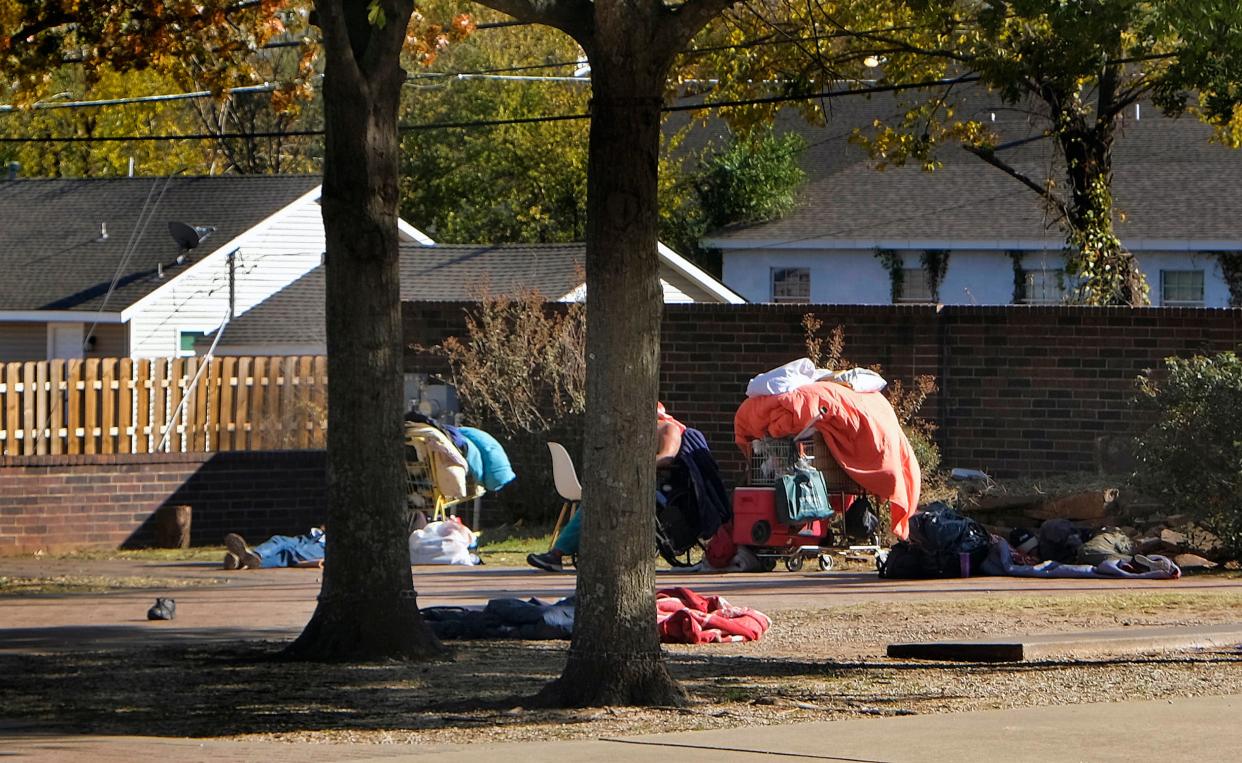
SHAWNEE — Sleeping bags, bikes and shopping carts filled with belongings line the sidewalks in a downtown park, marking the area where many of those experiencing homelessness spend their days and nights.
Keith Amos, who spent a year and a half living on Shawnee's streets until about eight months ago, said different groups would bring food to the park to make sure he and others were fed.
"Sunday morning, to get something hot in your belly was a godsend," Amos said.
Now he continues the tradition that "meant the world" to him, but recently the city passed a law that regulates feeding the homeless downtown — a move that Amos and other advocates say is the latest brick in the wall preventing progress toward ending homelessness in Shawnee.
In the city of 30,000, there were 100 people living on the streets or in a shelter during the 2023 point-in-time count. That's 3 for every 1,000, slightly above the national average and Oklahoma City's homeless population.
Shawnee, like many other small communities in America, has little access to affordable housing and mental health services. Its poverty rate is 7 percentage points above the national average, and it's only been two years since the town followed in the footsteps of larger cities by hiring a Homeless Program Coordinator who leads the city's efforts in helping people get off the streets.
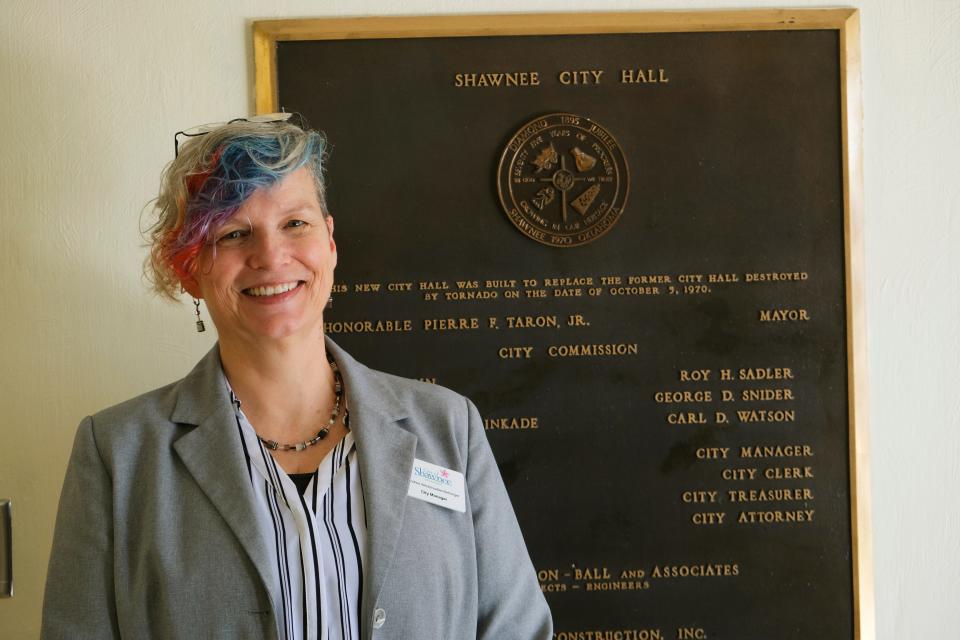
City Manager Andrea Weckmueller-Behringer said the new ordinance is meant to address groups who were dropping food off downtown, often at the Celebration of Life Park or the public library across the street, and leaving without picking up the trash.
The city had hoped the groups would be willing to bring the food to the Homeless Resource Center, Weckmueller-Behringer said, which is about a half-mile walk from the downtown park and opened in 2022. But as some have said they're not willing to do so, she said the ordinance creates a permit process and a way to know whom to contact about any leftover trash.
More: Homeless students, teenagers walk a hidden path in rural Oklahoma
"In no way shape or form was the city ever interested in stopping meal operations for our homeless neighbors," Weckmueller-Behringer said. "That was never the purpose. The purpose of the ordinance is to make sure that there is coordination and that sanitary conditions are observed and that nobody can leave trash for somebody else to pick up."
City leaders and business owners say it's a step toward coordination and keeping downtown free of rotting food and trash, while advocates like Amos see it as a form of making it harder to serve a vulnerable population.
"I think they're punishing us for helping people," Amos said. Amos said The Salvation Army is now allowing them to use their property, which is exempt from the ordinance, to feed people on Sunday.
What's in the ordinance?
Details from the ordinance, which was passed Oct. 16 and goes into effect Nov. 16, include:
the boundaries regulated by the ordinance are Highland Street, Seventh Street, Harrison and Kickapoo Street
a feeding operation is described as "an organized and deliberate preparation and/or serving of food to four or more individuals for free"
feeding operations occurring indoors or on private property are not affected, or those being held in conjunction with a declared emergency or similar event
the first offense is a $250 fine, and $500 for all subsequent offenses
anyone who violates the ordinance cannot apply for a permit to feed for one year
The current application for a special event permit must be completed 60 days in advance and requires liability insurance. But Weckmueller-Behringer said the city is working on a separate process for feeding operations, which would only require a few days' notice and would have no cost associated.
City of Shawnee says uncoordinated feeding efforts left too much trash downtown
The Homeless Resource Center feeds between 50 to 70 people lunch five days a week, but it is closed on Fridays and Sundays.
Just one block from the Celebration of Life Park is The Salvation Army, which has about two-dozen beds and provides a dinner each day for residents and those living unsheltered. Though the meal is to-go for those who don't live in the shelter, Capt. Ian Carr said everyone is asked to stay on the property and throw their trash away when finished.
Other meals can be found in the community but not on a daily basis. To fill this gap, various groups and individuals will bring food to the park on Sundays.
Lee Rutherford, owner of The Lunchbox less than 200 feet from the park, said the lack of coordination meant there were some Sundays when four or five groups dropped off food within a matter of hours.
"There's so much food that's not being eaten, because they're inundated with everybody coming at one time," Rutherford said.
More: Report: Oklahoma not doing enough to help residents find affordable housing
City commissioner and downtown business owner Cami Engles said she is thankful that there are people who want to help, but that some weren't responding to requests by business owners to prevent trash being left to rot or end up on a business' door.
"What was happening was, primarily on Sunday, groups were coming in and bringing a whole lot of food in like Styrofoam containers and just like a ton of stuff," Engles said. "And then they just left ... It's not like a situation where we were trying to keep people from helping the homeless, or feeding the homeless, but it was this mass amount of trash left over."
Weckmueller-Behringer said the ordinance was written after the city felt it had "come to a stalemate" when trying to work with these groups.
Sarah Inselman, who has been a volunteer serving Shawnee's homeless population for 15 years, said it's "outrageous" that the city would fine someone for feeding the homeless. She also said she doesn't understand the focus on wanting all meals to be given out at the resource center, even though the building is closed on Fridays and Sundays.
"Why should the people have to walk seven blocks to get here? Some of them can't," Inselman said. "That's why they're (downtown). They can walk a block to The Salvation Army, but they can't walk all the way over here. I need a van so I can go pick them up."
Those who do walk to the center for lunch carry with them backpacks and trash bags packed full of their belongings so that nothing is stolen. The center volunteers tag the bag and hold it until they're ready to leave.
Volunteers make lunch, other resources possible for homeless in Shawnee
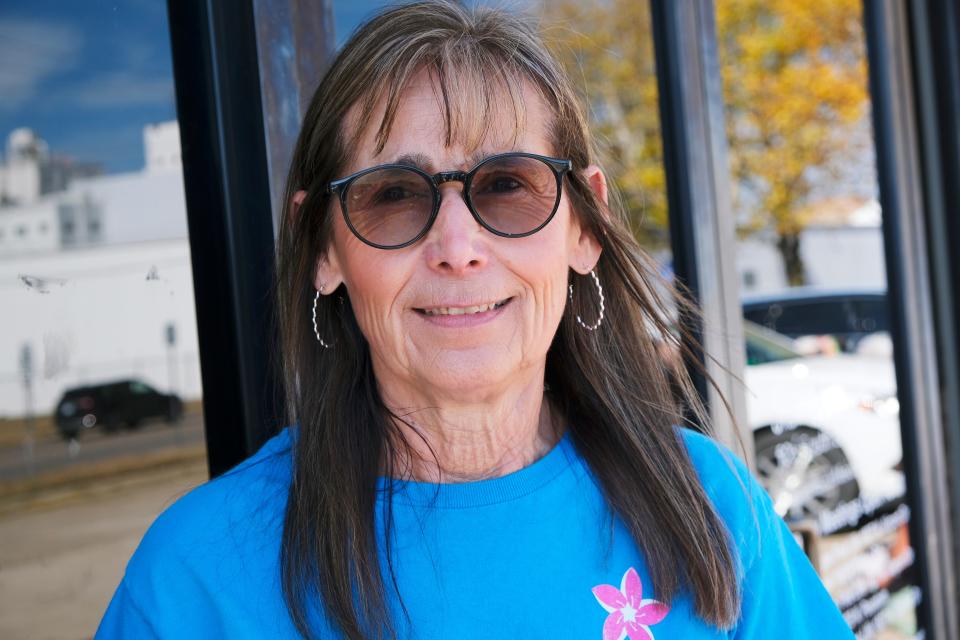
Walking into the Homeless Resource Center on a Monday afternoon, people experiencing homeless or just in need of a meal likely will be greeted by name by LaDonna Jessee.
They'll sign in and hand over their backpack or sometimes trash bag packed full of belongings to be labeled and kept safe behind the counter.
Jessee has volunteered at the center on Mondays for about a year, and said she has a heart for the people who come in each week. She said she believes just spending time serving the homeless, which she hears many refer to as "those people," can change a person's perspective.
"Once 'those people' become 'your people,' then you begin to love and care about them," Jessee said. "'Those people' are humans."
The city of Shawnee hired its second-ever Homeless Program Coordinator in 2022, Erika Genty, and over the past year has started a collaboration between local nonprofits and churches to streamline efforts to serve the homeless.
One result is the city's Homeless Resource Center, which provides lunch, as well as clothing and help getting IDs and other needed documents. The center is operated out of the Shawnee Rescue Mission, under an agreement where the mission leases the building to the city at no cost, but the city pays for utilities.
Weckmueller-Behringer said many of the groups who now feed at the center would bring food downtown before, because there was nowhere else to go.
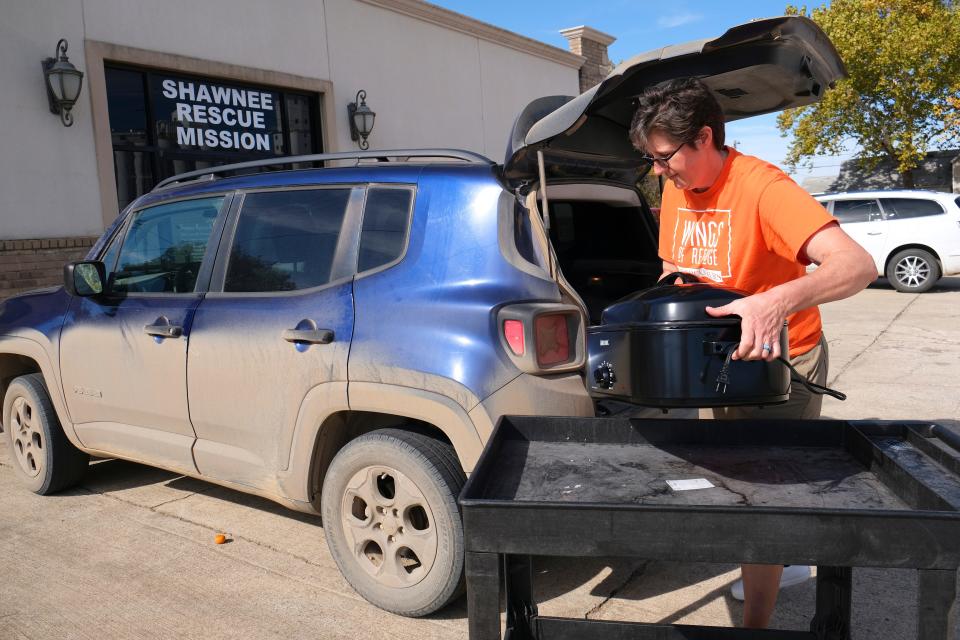
Allana Stephens brings lunch on the first Monday of the month to the Homeless Resource Center. She cooks the meal and brings it, completely on her own, after seeing a Facebook post about there being a need.
For November, she brought spaghetti with a meat sauce, green beans, bread and cookies. Stephens is also part of a group that provides a free meal every Wednesday in Prague, about a half-hour drive from Shawnee.
"This is just an extension of it, in my mind," Stephens said. She said she does it to just "love on people."
City hopes to create designated shelter site
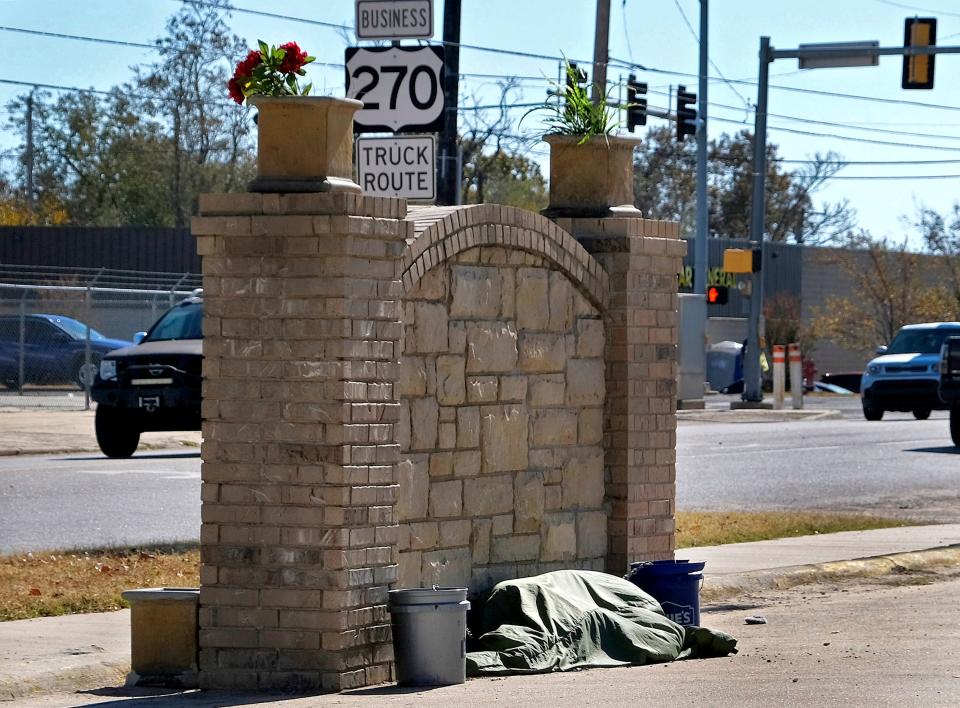
Amos said he sees the new feeding ordinance as representative of the city's desire to move the homeless out of downtown, which is where he said they were "pushed" when businesses moved away from Main Street.
"Now that the property values are so low, people are actually trying to invest in it," Amos said. "And I think that's where we're getting the conflict now, is people are losing money, and so the (homeless) people got to go."
According to an Aug. 21 city commission meeting, the city is working toward being able to prohibit camping on public property.
Before it can do so, there must be a designated shelter site, Weckmueller-Behringer said at the meeting. The city currently has no shelter besides the two-dozen or so beds at The Salvation Army, which requires proof of ID among other things.
Right now, the city is planning a temporary shelter site at what is currently Dockery Park on the southwest side of town. The idea was proposed in August and would be modeled after similar sites in Denver, East San Diego and Las Cruces, New Mexico.
The proposal includes building a series of 60-square-foot Conestoga huts that lock, with portable toilets, handwashing stations and showers on site. The cost would be $300,000 to $400,000 to set up the site, with an ongoing cost of $50,000 to $70,000 per month.
Weckmueller-Behringer said the city hopes to have the site ready before the winter's first big cold snap, and it may not be something the city commission has to approve. She also said at the August meeting that the site would be temporary until a more permanent shelter can be built.
'Tired' downtown business owners take action
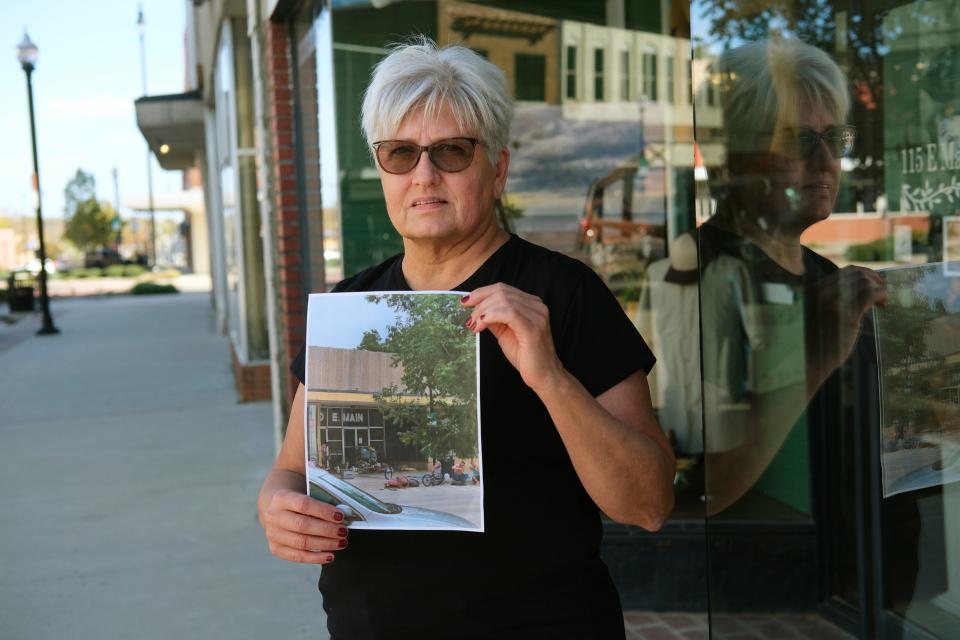
After more than 30 years of operating her embroidery business on Main Street, Theresa Cody said she and other business owners created a "downtown watch" group and placed cameras along the street in hopes of sharing their concerns about drug activity and other crimes with the city.
Cody also lives downtown above her business, Uncommon Threads. One June morning, Cody said she walked out of her front door to see what she perceived to be a group of homeless people sitting at a storefront across the street. In a photo shared with The Oklahoman, some appeared to eat food and others appeared to be working on bicycles.
That was a turning point for her, she said, in deciding to push for more help from the city.
"(City leaders) weren't listening at all in the beginning until we all raised a ruckus, because we were tired of being the place that everybody assumed the homeless was going to live," Cody said. "And they assumed this is where they should be, they assume this was where they deliver their drugs, they assume this is where they deliver their food."
Videos and photos are posted to a Facebook page of the homeless sleeping in the park or leaning against walls downtown, or of occasional suspicious activity.
But not all downtown business owners agree with this. Claudia Crowe, owner of Crow's Main Street Market, said she understands the need for cameras and security, but doesn't like that folks' actions are on display on YouTube and social media.
"I think that is reprehensible," Crowe said. "I've stopped going to the (neighborhood watch) meetings because of that. These people have lost their self-respect, their dignity, their desire to achieve anything, their homes, their possessions. Do you really think putting them on camera is gonna make a difference?"
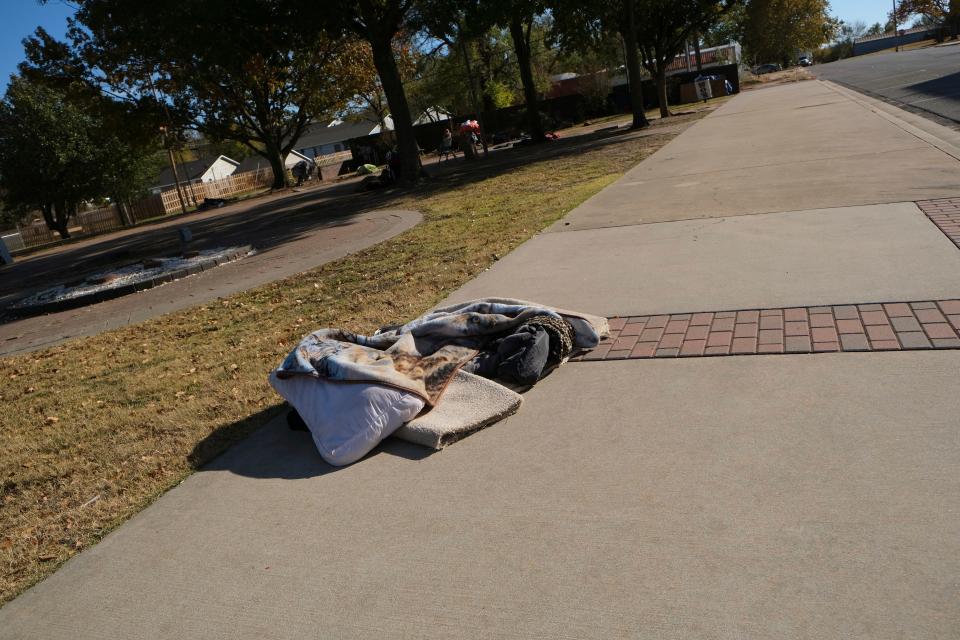
Complaints about the state of downtown and new regulations surrounding the homeless living in the park are nothing new, as detailed in a ThinkProgress 2014 article titled: "Welcome To Shawnee, Oklahoma: The Worst City In America To Be Homeless."
The article details the Shawnee Rescue Mission's fight to open an overnight shelter with a $450,000 grant it received. It was turned down by both the planning commission and the city commission over concerns about how the shelter would impact the surrounding neighborhood, ThinkProgress reported.
The article also cited different things implemented by the city, like turning off the water and removing the benches from the downtown park where some were sleeping.
'Nobody's saying don't help your fellow man'
Crowe has been a business owner on Main Street since 2000, and said there's always been a homeless population downtown. What has changed, from her perspective, is the increase in the unhoused who are dealing with addiction and mental health issues.
When she can, Crowe leaves a box on her back door with items that may be damaged or can't be sold. That's up for grabs for anyone who needs it, she said, but she still finds people going through her dumpster looking for something to eat.
There's even a woman who routinely has slept in her dumpster when it gets too cold out, and Crowe said she always cleans up after herself.
"How can that not impact you," Crowe said, "when you know somebody is at that lowest point of low?"
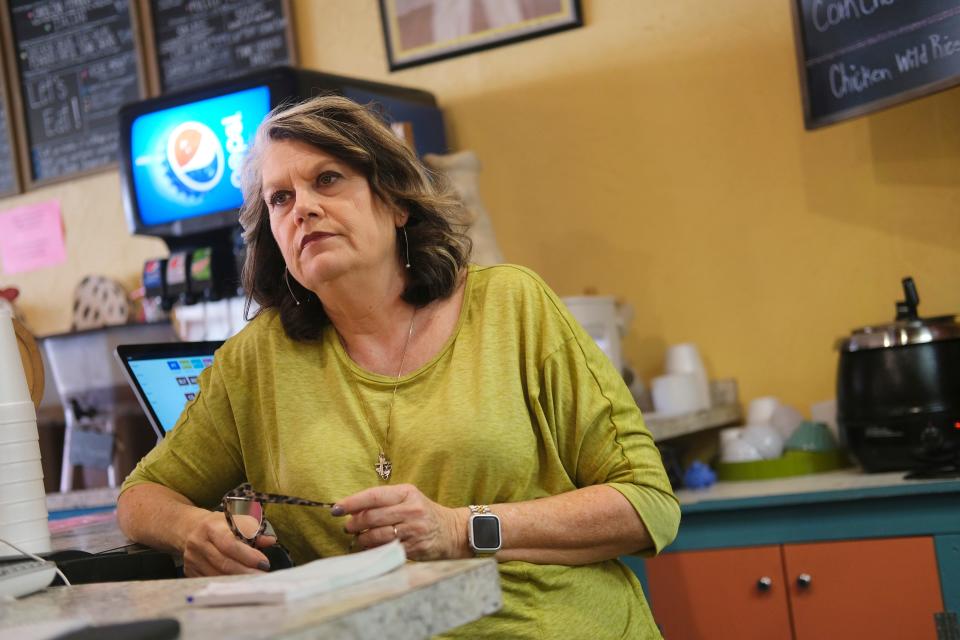
Rutherford, who owns The Lunchbox, said she's picked up everything from food trash to condoms to drug paraphernalia outside her business.
She, like Crowe and other business owners, have helped many of those living on the streets over the years. Rutherford said if someone comes in to her restaurant hungry, she won't turn them away. She's hired folks who were "down on their luck and came in off the sidewalk," or were living at The Salvation Army.
"Nobody's saying don't help your fellow man," Rutherford said. "That's not what this is about."
But she's hopeful the ordinance will create a more coordinated effort, and said she believes it can benefit everyone involved.
This article originally appeared on Oklahoman: Why the city of Shawnee is regulating feeding the homeless downtown

